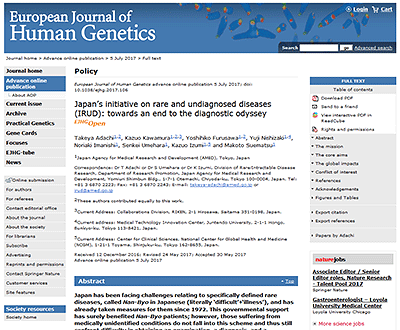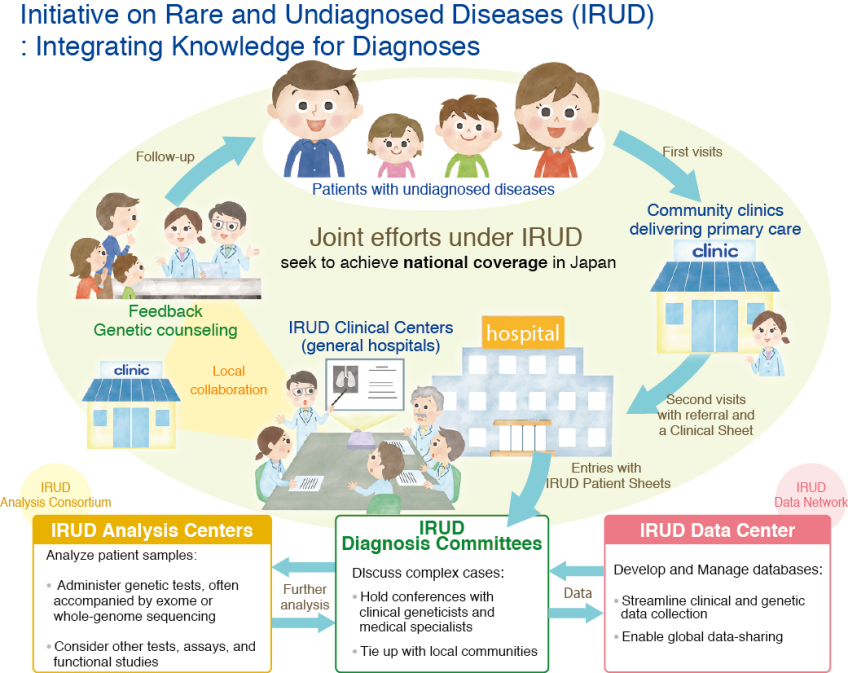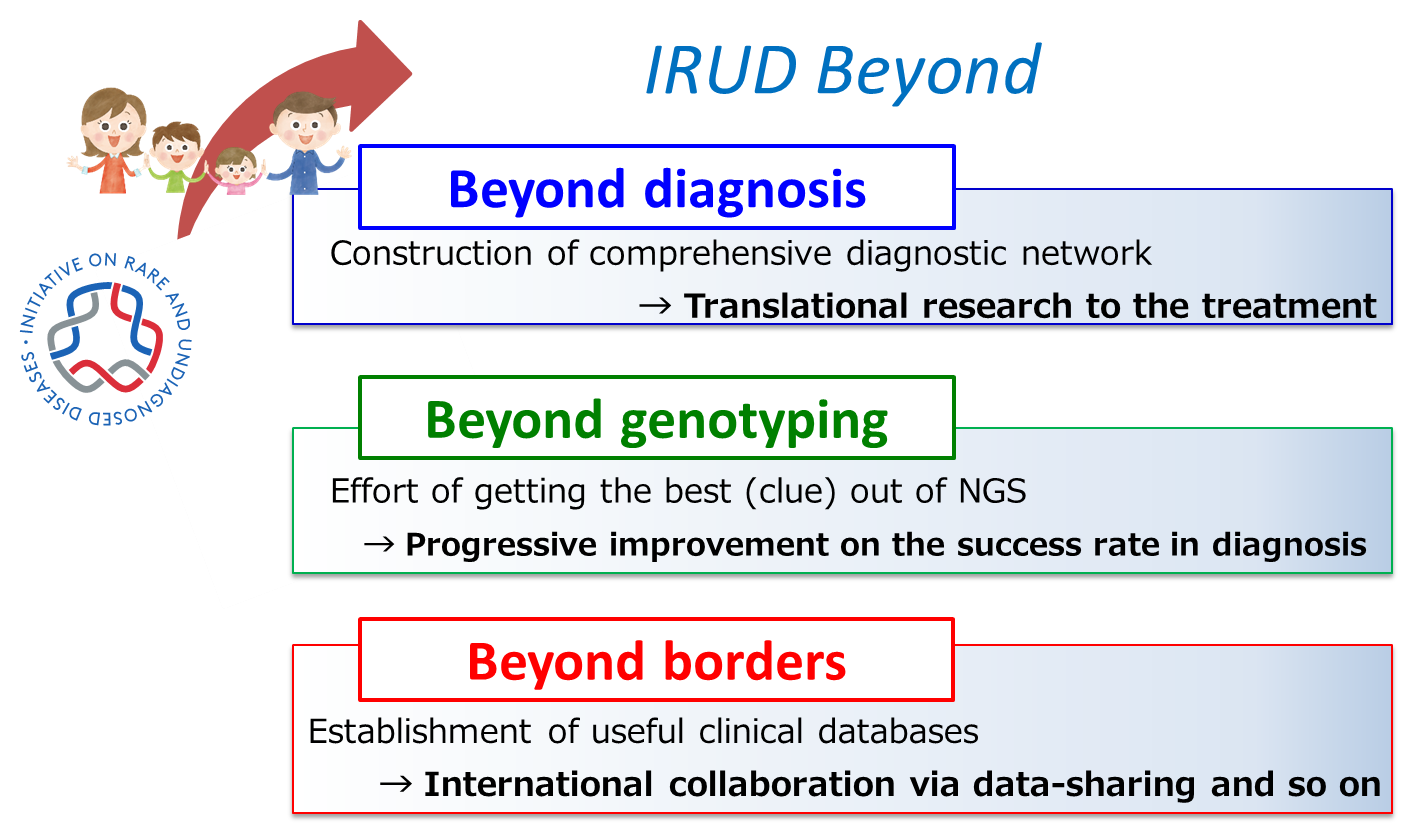Programs Initiative on Rare and Undiagnosed Diseases (IRUD)

The Initiative on Rare and Undiagnosed Disease (IRUD) is a clinical research program for patients with a rare disease. Due to the complications of their symptoms many sufferers remain undiagnosed even when seen by a medical professional. Moreover, so little is known about the etiology of rare diseases that very few treatments can be administered due to lack of development.
In 2015 the Japan Medical and Research Development Agency (AMED) launched IRUD as part of the Rare/Intractable Disease Project of Japan. The nation-wide research group aims to support the diagnosis of patients with undiagnosed disease via data sharing and promote research into pathology that may lead to the development new treatments and therapies.
IRUD’s existence is only possible due to cooperation from across the nation and from the international community. This comes from, but is not limited to: patients, families, physicians, medical staff, researchers, research supporters, grant agencies, administration, and many other stakeholders throughout the Japan.
To perform its role IRUD has established:
- A comprehensive diagnostic system encompassing clinical information and other information including genetic analysis
- A globally compatible and active data sharing system
AMED maintains close ties to the Ministry of Health, Labour and Welfare regarding implementing medical services for Nan-Byo patients (Nan-Byo is a legally defined group of diseases characterized by their rare and intractable nature), and to local governments in creating policy measures against Nan-Byo.
An IRUD approach to research and development
IRUD researchers, IRUD clinical centers and cooperative hospitals work to achieve the following concepts:
- Work with medical services in the rare and intractable diseases field
- Establish a system that works autonomously nationwide that is compatible with diverse diseases
- Promote research that acknowledges regional cooperation
- Promote research that acknowledges microattribution*
- Coordinate with projects to promote research on undiagnosed diseases
- Promote data sharing
* IRUD acknowledges and credits all participants which without it could not function. This includes collaborators from patients, family members, local primary care physicians, university hospital physicians, nurses, cooperating medical bodies, researchers, genetic counselors, and anyone supporting patients.
Under these principles IRUD supports activities such as establishing nationwide diagnostic system, advancing research that identifies responsible disease genes and defining new disease entities, and generating databases, etc.
Japan’s Initiative on Rare and Undiagnosed Diseases (IRUD): Towards an end to the diagnostic odyssey
 Since its launch in 2015, IRUD’s policy was documented in an article in the European Journal of Human Genetics (doi: 10.1038/ejhg.2017.106). It reports the funding mechanisms for its creation which draws on Japan’s strengths such as its long history of pursuing Nan-Byo.
Since its launch in 2015, IRUD’s policy was documented in an article in the European Journal of Human Genetics (doi: 10.1038/ejhg.2017.106). It reports the funding mechanisms for its creation which draws on Japan’s strengths such as its long history of pursuing Nan-Byo.Diagnostic System

AMED work with IRUD: Timeline
Fiscal 2015 (Apr-Mar)
- Joint meeting with the US Undiagnosed Diseases Network (UDN) for data sharing held at AMED’s headquarters. (October)
- Launch of the IRUD Executive Committee. IRUD’s policy of operation and project plan are created in association with research groups. (December)
- AMED joins the International Rare Diseases Research Consortium (IRDiRC) as a funder. AMED participates in policy discussions at IRDiRC, which contributes to the acceleration of research and development in rare diseases, and also collects up-to-date information necessary for international cooperation. (July) (click for the article)
- IRUD was publicized to the National University Hospital Council of Japan, the Association of Japanese Private Medical Schools and Medical Professionals, and to various medical associations.
Fiscal 2016 (Apr-Mar)
- IRUD’s policy of operation and project plan is publicized. AMED and research groups declare their shared ideals with IRUD. (April)
- IRUD participates in the Tokyo Conference of Undiagnosed Diseases Network International (UDNI) (November). AMED have since actively engaged in UNDI meetings to facilitate international research cooperation and promote activities linked to AMED’s international strategy.
- Results from two nationwide surveys are reported at the IRUD Executive Committee. The results implied the number of undiagnosed patients nationwide to be in the tens of thousands and forms the factual evidence for forming IRUD programs. (February) (click for the article).
Fiscal 2017 (Apr-Mar)
- Initiative on Rare and Undiagnosed Diseases in Pediatrics and Initiative on Rare and Undiagnosed Diseases in Adults are merged and the integration protocol is drawn (April). This protocol is conditionally approved by the Central Institutional Review Board (CIRB). (February)
- IRUD Beyond is launched with the purpose of furthering IRUD achievements. (June)
- With the cooperation of the Japan Medical Association, IRUD is presented in the ‘Working Paper of the Japan Medical Association Research Institute’. (August) (click for the related article)
- IRDiRC consortium assembly is held at AMED’s headquarters. IRUD’s achievements are presented. (November) (related article)
- IRUD takes part in the Matchmaker Exchange (MME), a global platform for rare disease data sharing, to work towards the promotion of data sharing. (related article)
Fiscal 2018 (Apr-Mar)
- The ‘All Japan’ research system is established where IRUD Coordinating Center orchestrates analysis and clinical centers funded via public grant calls. (April)
- The number of hospitals taking part nationwide in the IRUD diagnostic system reaches 418. (July)
IRUD Beyond: Expanding Horizons
IRUD Beyond was established combining new grounds to advance the research efforts from IRUD. It comprises three pillars:
- Beyond diagnosis: Innovative medical drug candidates will be invented by targeting novel, single pathological mutations discovered in IRUD research.
- Beyond genotyping: Innovative technologies will be applied to cases that remain unsolved after next generation sequencing (NGS)-based genome analysis.
- Beyond borders: International data sharing will be facilitated even more in such a way that inaccessible but medically valuable databases get integrated into globally compatible systems.

Current research (as of December 2018)
IRUD
Initiative on Rare and Undiagnosed Disease (IRUD): Study for the development of a diagnostic program
Principal Investigator: Hidehiro Mizusawa - National Center of Neurology and Psychiatry
In force as of 2018 Link to work (IRUD Portal)
IRUD Beyond
Beyond diagnosis
Elucidation of their molecular pathology of rare disease genes found via IRUD-P with genome editing and research into therapeutic/prophylactic methods
Principal Investigator: Yoichi Matsubara - National Center for Child Health and Development
Initiated since 2017
*IRUD-P – Initiative on Rare and Undiagnosed Diseases in Pediatrics
Beyond diagnosis
Elucidation of pathophysiology of rare intractable neurodevelopmental disorders utilizing mutation knock-in mouse models developed by CRISPR/Cas9 genome editing system, and exploring novel therapeutic agent
Principal Investigator: Hirotomo Saitsu - Hamamatsu University School of Medicine
Initiated since 2017
Beyond diagnosis
Discovery of drug and treatment for cerebral creatine deficiency
Principal Investigator: Sumio Ohtsuki - Kumamoto University
Initiated since 2018
Beyond diagnosis
Therapeutic interventions for Takenouchi-Kosaki syndrome using CDC42 inhibitors
Principal Investigator: Toshiki Takenouchi - Keio University
Initiated since 2018
Beyond genotyping
Coordination network for elucidating disease mechanism using model organisms
Principal Investigator: Ituro Inoue - Research Organization of Information and Systems
Initiated since 2017 Link to work (J-RDMM)
Beyond borders
Research for global sharing of R&D pipelines on rare and intractable diseases by creating web-based communication media
Principal Investigator: Atsuhiko Kawamoto - Foundation for Biomedical Research and Innovation at Kobe
Initiated since 2017 Link to work (Orphanet Japan), Link to work (Nan-Byo Research)
Completed research
The national cross-sectional collection, banking and analysis of the undiagnosed genetic diseases
(Initiative on Rare and Undiagnosed Diseases in Pediatrics, IRUD-P)
Principal Investigator: Yoichi Matsubara - National Center for Child Health and Development
Conducted during 2015-2016 (Initiative on Rare and Undiagnosed Diseases in Pediatrics and Initiative on Rare and Undiagnosed Diseases in Adults merged in 2017)
Research for the development of ‘Initiative on Rare and Undiagnosed Diseases in Adults’
Principal Investigator: Hidehiro Mizusawa - National Center of Neurology and Psychiatry
Conducted during 2015-2017
News
Contact
| Division Name | Division of Strategic Planning and Evaluation, Department of Innovative Drug Discovery and Development, Japan Agency for Medical Research and Development (AMED) |
|---|---|
| irud”at”amed.go.jp (Please change “at” to @) |
Links
Last updated 05/01/20

